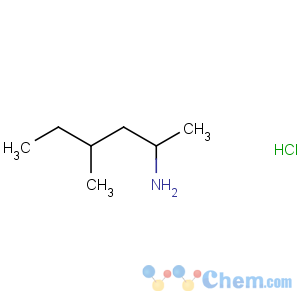Methylhexanamine
-

Molecular Structure
Detailed Description
Product Name:Methylhexanamine,DMAA
Alias:dimethylamylamine,methylhexamine
CAS Registry Number:13803-74-2
Molecular Formula:C7H18ClN
Molecular Weight:151.68
Appearance:White Crystalline powder
Grade:Pharmaceutical Grade
Methylhexanamine is synthesized by reacting 4-methylhexanone-2 with hydroxylamine, which converts the 4-methylhexanone-2 to 4-methylhexanone-2 oxime, which is reduced with hydrogen by means of a catalyst; the resulting methylhexanamine can be purified by distillation.
Fat Loss
A large number of supplements focusing on fat loss and workout energy (thermogenic or general-purpose stimulants) now use the ingredient in concert with other substances such as caffeine, a combination similar to the combination of ephedrine and caffeine.
Methylhexanamine is an indirect sympathomimetic drug that constricts blood vessels and thus has effects on the heart, lungs, and reproductive organs it also causes bronchodilation, inhibits peristalsis in the intestines, and has diuretic effects.Most studies have been done on pharmacological effects when the drug is inhaled; our understanding of what methylhexanamine does when taken orally are mostly based on extrapolating from the activities of similar compounds.Today, dimethylamylamine is sold as a dietary supplement used for attention deficit-hyperactive disorder (ADHD), weight loss, improving athletic performance, and body building.
Athletes and bodybuilders are constantly persuing lean body mass.When it comes to sports performance and building,some turn to dietary and sports improving supplements to boost their athletic performance or lose body fat. One such supplement ingredient called methylhexamamine or DMAA is advertised for this objective and is currently the topic of some controversy.
How Does DMAA Work?
DMAA has stimulant results significantly like caffeine. Individuals who take it experience more energized and have better mental focus without any the jitteriness that many people experience when they drink an excessive amount of caffeine. At exactly the same time, DMAA causes constriction of blood vessels and dilation of bronchioles in the lungs.It’s also an appetite suppressant and may cause weight loss in some people.
Using and Dosage
A typical starting dose of 1,3-DMAA is in the 10-20mg range and eventually reaching up to 40-60mg a day, there is no actual evidence to support this dosage range but it seems to be the standard dosages range for supplemental 1,3-DMAA on the market.



